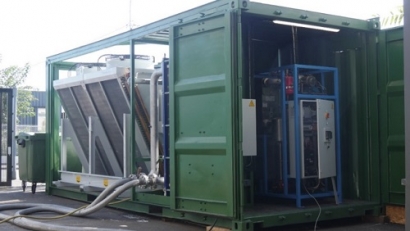
In keeping with this goal, six demonstration sites were selected based on temperature, flow and geological environment. The first demonstration sites are Chaunoy (France, sedimentary geological context), Soultz-sous-Forêts (France, granitic geological context) and Reykjanes (Iceland, volcanic geological context). Enogia ORC (Organic Rankine Cycle) Modules will be installed on the sites. These modules have been adapted to the geothermal fluid, the ORC’s design results of the material compatibility analysis conducted by ICI and ESG at each demonstration site.
The main objective is to adapt the ORC to the specificity of geothermal application, especially through the sourcing and testing of adapted, cost-effective, heat exchangers technology in order to make the ORC compatible with geothermal water chemistry originating from various geological conditions. The ORC has to be tested in one volcanic demonstration site, two sedimentary demonstration sites and two granitic demonstration sites.
Enogia has launched the factory acceptance tests of the ORC module which will soon be installed in Chaunoy on the Vermillion site. The functional tests have been validated and the performance tests are in progress.
The ORC is equipped with a plate and cassette heat exchanger. This titanium evaporator allows to overcome the constraints of corrosion caused by the geothermal fluid. This ORC will validate the production of electricity on this type of installation. This ORC will be installed at a low-flow, low-temperature (90 ° C) site. The electricity production is estimated between 14 and 18 KW, depending on the ambient temperature.
In addition, as part of the project, tests will be conducted on samples of materials to find the most suitable heat exchanger material adapted to the specificity of this geothermal environment. A detailed analysis will be carried out on the Vermillion demonstration site after five months of testing.
The project has received funding from the European Union’s Horizon 2020 research and innovation program.

